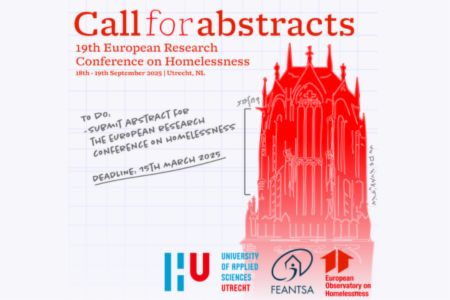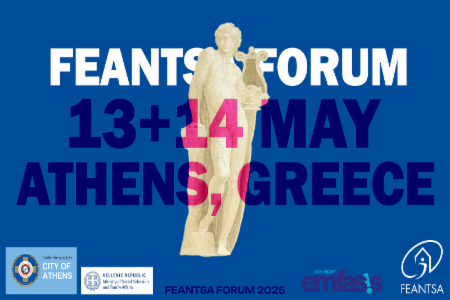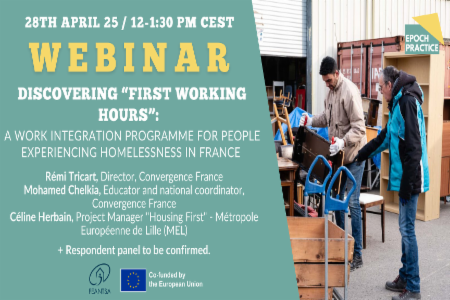FEANTSA strongly denounces the criminalisation of homeless people in Denmark

Read and download the press release here (online PDF)
Poverty must be hidden from the average Danish citizen. This is the message of the Danish Supreme Court ruling, which, on the 2nd of February 2022, sentenced a Lithuanian citizen to 60 days unconditional imprisonment for begging. The person was homeless in Copenhagen and suffered from drug addiction. He was begging with a cup in his hand by the Copenhagen Central Station when the police arrested him in 2019. He has been convicted several times since, according to the Danish Criminal Code §197. At the level of the City Court, the Lithuanian citizen received a previous sentence of 60 days unconditional imprisonment, deportation from Denmark and a 6-year entry ban. This judgment has subsequently been confirmed by the High Court.
Since 2017, changes in the Danish Penal Code have contributed to increasing criminalisation of the presence of homeless people in public spaces.[i] Strongly condemned by civil society, the inhumane policies introduced restrictions on sleeping rough and increased punishment for begging. Article 3 (4) amended the Public Order and stated that “In places with public access it is prohibited to establish and stay in camps, which are capable of creating discomfort in the neighbourhood.” Under section 197 begging became illegal and punishable with prison up to 6 months, without a warning when the offense has been committed in a pedestrian street, at stations, in or near supermarkets or in public transport. It has also been openly stated, and confirmed by practice since then, that the aim of these policies was targeting non-Danish citizens living homeless on the streets of Denmark: from 94 convictions under paragraph 197, 91 were non-Danes.[ii] [iii]
Five years after the implementation of these policies, which had severe negative consequences on people’s lives, on the 2nd of February 2022, for the first time ever the Danish Supreme Court has ruled that being imprisoned for begging is not a violation of human rights. FEANTSA and its Danish members at projekt UDENFOR and Kompasset Kirkens Korshaer strongly condemn the approach being taken by the Danish state and call for the human rights of all those living on the margins of our societies to be upheld. Moreover, we consider this is a missed opportunity to denounce abusive policies and to send an important message to the world – that human rights must be upheld beyond social class or nationality and ethnicity. Criminalisation of poverty and homelessness further punishes people and contributes to their stigmatisation and exclusion from society. Homelessness is not a choice and people experiencing poverty should be offered support and not be further penalised.
In January 2021, the European Court on Human Rights (ECtHR) ruled in the case Lăcătuş v. Switzerland that anti-begging laws violated the right to respect for private and family life. While the judgement did not state that begging should be decriminalised as a general principle, it did find that by imprisoning the woman who could not pay the fine received for begging, the city of Geneva violated her right to respect for private and family life (Article 8 of the ECHR).[iv] In the case heard by the Danish Supreme Court, the lawyer invoked Articles 10, 8, 14 and 3 of the ECHR. As in the case from Switzerland, the defence lawyer argued that the case of the Lithuanian citizen was a matter of human dignity, and that his sentence for begging was depriving him from the last dignity he had left, after he had lost everything else in life.
FEANTSA would also like to recall that Denmark has committed itself in June 2021, by signing the “Lisbon Declaration on the European Platform on Combatting Homelessness”,[v] together with all the other Member States of the EU, to work towards ending homelessness and to ensure that “no one is discriminated due to their homelessness status.” In 2021, the Danish Government had published a new national strategy to combat homelessness.
The ruling of the Supreme Court from the 2nd of February contradicts these commitments – by putting people in prison for being poor instead of creating support mechanisms, their human rights are being infringed and they are being punished for coping with homelessness and poverty. Furthermore, applying a differential treatment based on the nationality of people who are destitute is equal to discrimination.
Criminalisation and removal from the public eye will not contribute to solving the issue of poverty and lifting people out of destitution. We call on the Danish state to put an end to the criminalisation of homelessness and to uphold the human rights of all those living on the margins of society.
[i] Criminalising rough sleeping in Denmark
[ii] These numbers are subject to some uncertainty, more details can be found here https://domstol.dk/media/dcvilmit/91-2020-anonym-dom.pdf[iii] https://ec.europa.eu/migrant-integration/news/denmark-national-court-rules-against-human-rights-judgement-migrant-begging-case_en
[v] https://www.feantsa.org/en/press-release/2021/06/21/press-release?bcParent=27





